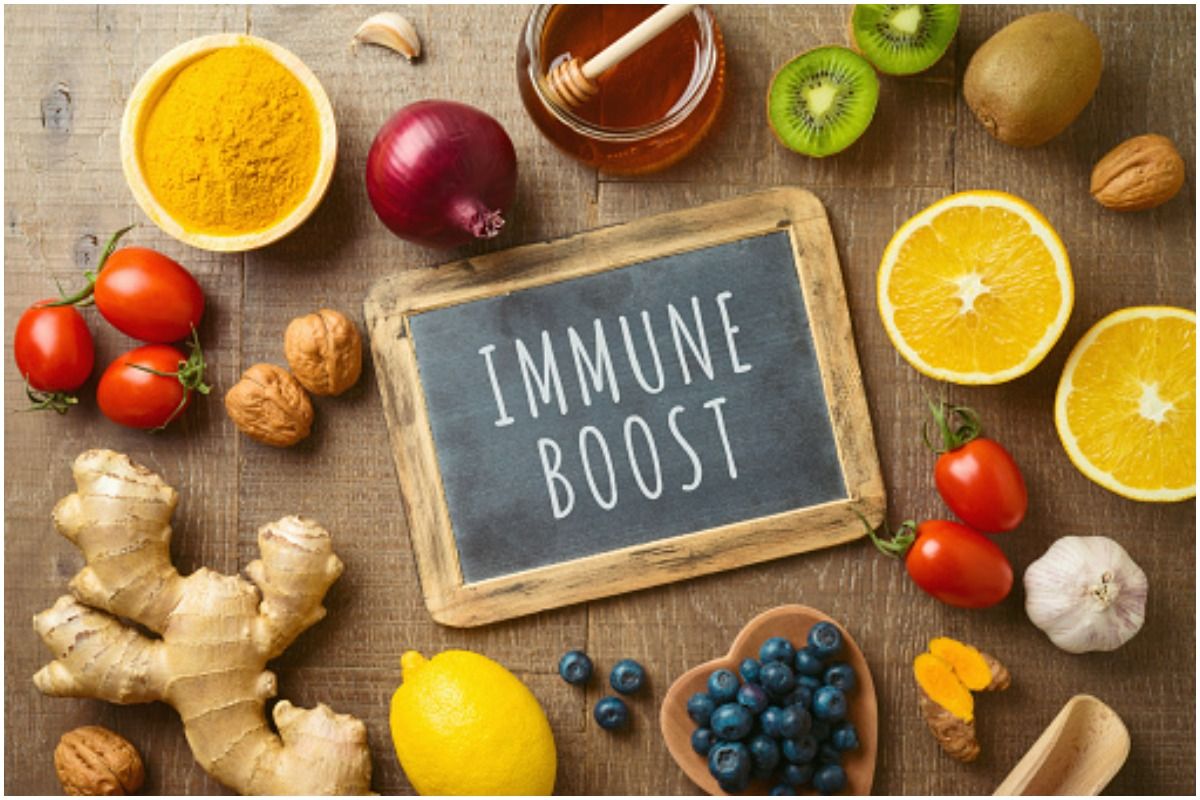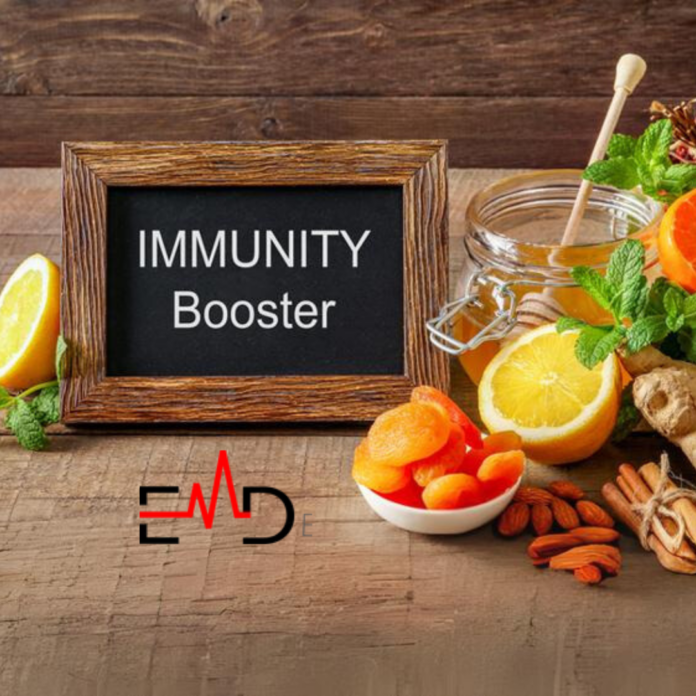Table of Contents
Exercise Daily – In today’s fast-paced world, a robust immune system is your body’s best friend. It’s like having an invisible shield that defends you against various illnesses. But with all the stress and pollution, how can you naturally boost your immune system? Well, we’ve got you covered! This article will explore 15 effective ways to strengthen your immune system without using chemical shortcuts.
Get Enough Sleep
Sleep often takes a backseat in today’s hustle and bustle, but it’s one of the fundamental pillars of a healthy immune system. Let’s explore why sleep is crucial and how to ensure you get enough of it.
1. Create a Sleep Routine
Creating a consistent sleep routine is like giving your body a daily invitation to rest and rejuvenate. Here’s how to establish a sleep routine:
- Set a Regular Bedtime: Going to bed and waking up simultaneously daily helps regulate your body’s internal clock. This consistency reinforces your natural sleep-wake cycle.
- Wind Down: About an hour before bedtime, engage in calming activities like reading, gentle stretching, or a warm bath. This signals to your body that it’s time to relax.
- Limit Screen Time: The blue light emitted by screens can interfere with your sleep quality. Avoid electronic devices before bed, or use blue light filters.
2. Dark and Quiet Environment
Your sleep environment matters more than you might think. Creating the right conditions can make a significant difference in the quality of your sleep:
- Darkness: Ensure your bedroom is as dark as possible. Invest in blackout curtains if needed. Darkness triggers the release of melatonin, a hormone that regulates sleep.
- Quietness: A quiet environment is essential for uninterrupted sleep. If noise is an issue, consider using earplugs or white noise machines to drown out disturbances.
Eat a Balanced Diet
What you put into your body profoundly impacts your overall health, including your immune system’s strength. So, let’s explore the importance of a balanced diet and some specific dietary choices that can bolster your immunity.
1. Fruits and Vegetables
Fruits and vegetables are nutritional powerhouses that should be a cornerstone of your diet:
- Vitamins and Minerals: These colorful foods are packed with essential vitamins and minerals, such as vitamin C, vitamin A, and potassium, which support various immune functions.
- Antioxidants: Fruits and veggies are rich in antioxidants like flavonoids and polyphenols, which help combat harmful free radicals in your body.
Here are some immune-boosting fruits and vegetables to include in your diet:
- Citrus Fruits: Oranges, lemons, and grapefruits are renowned for their high vitamin C content, which can help enhance your immune response.
- Leafy Greens: Spinach, kale, and Swiss chard contain vitamins, minerals, and antioxidants.
- Berries: Blueberries, strawberries, and raspberries are bursting with immune-boosting compounds.
2. Probiotics
A healthy gut is closely linked to a robust immune system. Probiotics are beneficial bacteria that support your gut health:
- Yogurt: Choose plain, unsweetened yogurt with live active cultures. It’s a tasty source of probiotics.
- Kefir: This fermented milk drink is another excellent option for probiotics.
- Kimchi and Sauerkraut: These fermented vegetables are rich in probiotics and add a zesty flavor to your meals.

3. Stay Hydrated
Water is often underestimated in its impact on our health, but it plays a crucial role in maintaining a robust immune system. So, this section will uncover why staying hydrated is essential and offer additional tips to keep your immune system in top shape.
1. Herbal Teas
Beyond regular water intake, herbal teas can be a delightful and immune-boosting alternative:
- Green Tea: This antioxidant-rich beverage contains catechins, which may have immune-enhancing properties. It’s also a comforting choice during colder months.
- Chamomile Tea: Known for its calming effects, it can help reduce stress, indirectly supporting your immune system.
- Ginger Tea: Ginger is famous for its anti-inflammatory and immune-boosting properties. A cup of ginger tea can provide warmth and wellness.
2. Signs of Dehydration
Knowing the signs of dehydration is crucial for maintaining proper hydration levels:
- Thirst: The most obvious sign that your body needs more fluids is feeling thirsty.
- Dark Urine: Dark yellow or amber-colored urine is a sign of dehydration. Ideally, your urine should be pale yellow.
- Dry Mouth and Skin: Dry mouth, dry skin, and cracked lips can all indicate that you need to drink more water.
- Fatigue: Dehydration can lead to fatigue and reduced cognitive function, indirectly affecting your immune system.
Exercise Regularly
Physical activity serves a greater purpose than simply staying fit; it’s a potent tool for fortifying your immune defenses. So, in this section, we will delve into the reasons behind the importance of regular exercise and provide practical insights to assist you in maintaining an active lifestyle.
1. Aerobic Exercise
Aerobic exercises, also known as cardiovascular exercises, are particularly effective at enhancing immune function:
- Jogging: Running at a moderate pace can improve cardiovascular health and boost your immune system.
- Swimming: Swimming is a full-body workout that enhances endurance and promotes well-being.
- Cycling: Whether on a stationary bike or outdoors, cycling is a low-impact activity that people of all fitness levels can enjoy.
2. Immune Benefits of Exercise
Regular physical activity offers several immune-boosting advantages:
- Improved Blood Circulation: Exercise promotes better blood circulation, which helps immune cells move more efficiently throughout your body.
- Stress Reduction: Physical activity triggers the release of endorphins, which reduce stress and improve mood. Lower stress levels can enhance your immune response.
- Weight Management: Maintaining a healthy weight through exercise reduces the risk of chronic conditions that can weaken the immune system.
3. Finding Motivation
Staying motivated to exercise can be challenging, but these strategies can help:
- Set Realistic Goals: Start with achievable fitness goals and gradually progress.
- Find Enjoyment: Choose activities you enjoy, whether dancing, hiking, or playing a sport.
- Stay Consistent: Establish a regular exercise routine by scheduling workouts in advance.

Manage Stress
Stress is a part of life, but chronic stress can affect your immune system. So, this section will explore the connection between stress and immunity and provide practical strategies for effective stress management.
1. Meditation and Deep Breathing
Meditation and deep breathing exercises are powerful tools for reducing stress:
- Mindfulness Meditation: Mindfulness can help you stay present, reduce anxiety, and manage stress effectively.
- Deep Breathing: Simple deep breathing exercises can calm your nervous system and lower stress hormones like cortisol.
2. Exercise as Stress Relief
Physical activity, such as yoga and tai chi, not only improves your physical health but also serves as a form of stress relief:
- Yoga combines physical postures, breathing exercises, and meditation to promote relaxation and reduce stress.
- Tai Chi: This gentle exercise focuses on slow, flowing movements that can enhance balance and reduce stress.
3. Time Management
Managing your time effectively can also alleviate stress:
- Prioritize Tasks: Identify your most important tasks and tackle them first. This reduces the stress of procrastination.
- Set Realistic Goals: Avoid overloading yourself with unrealistic expectations, leading to chronic stress.
4. Seek Support
Don’t hesitate to reach out to friends, family, or a therapist for support:
- Talk it Out: Sharing your thoughts and concerns with someone you trust can be cathartic and provide valuable perspective.
- Professional Help: If stress overwhelms you, consider consulting a mental health professional for guidance and coping strategies.
Get Adequate Sunlight
Sunlight isn’t solely about achieving a healthy tan; it plays a substantial role in your body’s capacity to ward off illnesses. Now, let’s delve into the significance of sunlight and discuss how you can ensure you’re receiving an adequate amount of it.
1. Vitamin D Production
Sunlight exposure triggers your skin to produce vitamin D, a crucial nutrient for immune function:
- Vitamin D helps regulate the immune system and protects the body against infections.
- Natural Source: Sunlight is the most natural and efficient vitamin D source.
2. Safe Sun Exposure
While sunlight is beneficial, it’s essential to get it safely:
- Timing Matters: Aim for 15-20 minutes of sun exposure on your arms and face a few times a week. Avoid peak sunlight hours to reduce the risk of sunburn.
- Use Sunscreen: If you plan to be in the sun for an extended period, apply sunscreen to protect your skin from harmful UV radiation.
3. Winter and Indoor Strategies
In regions with limited sunlight or during the winter months, consider these alternatives:
- Supplements: Consult a healthcare provider to determine if vitamin D supplements are necessary, especially if you’re at risk of deficiency.
- Indoor Light: Some indoor lights mimic natural sunlight and can help maintain healthy circadian rhythms.

Stay Social
While it might not be immediately obvious, maintaining social connections is essential for well-being and a strong immune system. Let’s uncover why socializing is crucial and how you can ensure you stay connected.
1. Loneliness and Immunity
Loneliness and social isolation can have adverse effects on your immune system:
- Stress and Inflammation: Loneliness can lead to chronic stress and inflammation, weakening your immune response over time.
- Mental Health: Isolation can contribute to mental health issues, such as depression and anxiety, indirectly affecting your immune system.
2. Ways to Stay Social
Even if you’re naturally introverted or have a busy schedule, there are ways to stay socially connected:
- Regular Check-Ins: Make an effort to check in with friends and loved ones regularly, even if it’s a quick text or call.
- Join Clubs or Groups: Consider joining clubs or groups related to your interests. This can be a great way to meet new people and forge connections.
- Volunteer: Volunteering not only helps others but also provides opportunities to socialize with like-minded individuals.
3. Virtual Connections
In today’s digital age, maintaining social connections has become more accessible:
- Video Calls: Platforms like Zoom and Skype allow face-to-face conversations even when physically distant.
- Social Media: While not a substitute for in-person interactions, social media can help you stay in touch with friends and family.
Limit Alcohol Consumption
While enjoying an occasional drink is okay, excessive alcohol consumption can affect your immune system. In this section, we’ll discuss the impact of alcohol on immunity and how to enjoy alcohol in moderation.
1. The Immune System and Alcohol
Alcohol can negatively affect the immune system in several ways:
- Reduced White Blood Cells: Excessive alcohol intake can decrease white blood cells, which are essential for fighting infections.
- Weakened Immune Response: Alcohol impairs the body’s ability to produce antibodies and mount an effective immune response.
- Digestive System Effects: Heavy drinking can harm the gut, where a significant portion of the immune system resides, potentially leading to immune dysfunction.
2. Moderate Alcohol Consumption
Moderation is key when it comes to alcohol consumption:
- Guidelines: Follow recommended guidelines for moderate drinking, which typically means up to one drink per day for women and up to two drinks per day for men.
- Choose Wisely: Opt for lower-alcohol beverages, and consider alternatives like mocktails or non-alcoholic beer or wine when socializing.
- Hydrate: If you do consume alcohol, drink water alongside it to stay hydrated.
3. Signs of a Problem
It’s essential to be aware of the signs of alcohol abuse or addiction:
- Increased Tolerance: Needing more alcohol to achieve the desired effect.
- Withdrawal Symptoms: Experiencing discomfort when not drinking.
- Neglecting Responsibilities: Prioritizing alcohol over work, relationships, or other important aspects of life.

Quit Smoking
Smoking, including the immune system, is one of the most detrimental practices for overall health. In this section, we’ll explore the severe impact of smoking on immunity and offer guidance on how to break free from this harmful addiction.
1. Smoking and Immune Suppression
Smoking has been linked to a wide range of health issues, including immune system suppression:
- Reduced Antibody Production: Smoking impairs the body’s ability to produce antibodies, making it harder to fight infections.
- Lower White Blood Cell Count: Smoking can decrease white blood cells, which are crucial for immune defense.
- Impaired Lung Function: Smoking damages the respiratory system, making it easier for infections to take hold in the lungs.
2. Strategies to Quit
Quitting smoking is a challenging but immensely rewarding endeavor:
- Seek Support: Consider enlisting the help of a healthcare professional, counselor, or support group. They can provide guidance and resources to aid in quitting.
- Nicotine Replacement Therapy: Options like nicotine gum, patches, or lozenges can help reduce withdrawal symptoms.
- Medications: There are prescription medications available that can assist in smoking cessation.
- Behavioral Therapy: Identify triggers and develop strategies to cope with cravings and stress without smoking.
3. Benefits of Quitting
Quitting smoking yields numerous health benefits, including improved immune function:
- Increased Lung Health: Over time, the lungs start to repair themselves, reducing the risk of respiratory infections.
- Lower Inflammation: Smoking cessation can reduce inflammation throughout the body, enhancing overall health.
- Better Immune Response: As your body recovers from the effects of smoking, your immune system becomes more effective at fighting off infections.
Prioritize Hygiene
Good hygiene practices are essential for reducing the risk of infections. Therefore, in this section, we’ll delve into the importance of hygiene and offer practical tips to help you and those around you maintain good health.
1. Handwashing
Handwashing is one of the simplest yet most effective ways to prevent the spread of infections:
- When to Wash: Wash your hands before eating, using the restroom, and being in public places.
- Proper Technique: Use soap and water, scrub your hands for at least 20 seconds, and clean between your fingers and under your nails.
- Hand Sanitizer: When soap and water are unavailable, use hand sanitizer with at least 60% alcohol.
2. Respiratory Hygiene
Respiratory hygiene is crucial to prevent the transmission of airborne illnesses:
- Cough and Sneeze Etiquette: Cover your mouth and nose with a tissue or your elbow when coughing or sneezing. Dispose of tissues properly.
- Face Masks: In situations where social distancing is challenging, wearing a face mask can help prevent the spread of respiratory droplets.
3. Clean and Disinfect
Regularly cleaning and disinfecting frequently touched surfaces can reduce the risk of surface transmission:
- High-Touch Surfaces: Focus on doorknobs, light switches, countertops, and phones.
- Cleaning Products: Use appropriate cleaning products and follow instructions for disinfection.
4. Personal Hygiene
Maintaining personal hygiene is essential for preventing infections:
- Shower or Bathe: Regular bathing removes dirt, sweat, and bacteria from your skin.
- Oral Hygiene: Brush and floss your teeth regularly to reduce oral bacteria.
- Clean Clothing: Change and wash your clothes regularly, especially after being in crowded places.
Supplements
While a well-balanced diet should provide most of the nutrients your body needs, sometimes supplements can help fill the gaps. This section will examine some common supplements that may support your immune system.
1. Vitamin C
Vitamin C is a powerful antioxidant that can enhance your immune function:
- Immune Support: Vitamin C helps stimulate the production of white blood cells, which are essential for fighting infections.
- Natural Sources: Citrus fruits, strawberries, and broccoli are rich in vitamin C.
- Supplements: Consider vitamin C supplements if you struggle to get enough through your diet.
2. Zinc
Zinc is another essential nutrient for immune health:
- Immune Function: Zinc helps activate immune cells and supports the body’s defense against infections.
- Natural Sources: Foods like beans, nuts, and whole grains contain zinc.
- Supplements: If your diet lacks zinc, supplements may be beneficial.
3. Vitamin D
Vitamin D plays a crucial role in immune function:
- Immune Regulation: Vitamin D helps regulate the immune system and reduce inflammation.
- Sunlight: Your body can produce vitamin D when exposed to sunlight.
- Supplements: In regions with limited sunlight or during winter, vitamin D supplements can be useful.
4. Multivitamins
Multivitamin supplements provide a convenient way to ensure you’re getting a variety of essential nutrients:
- Comprehensive Support: Multivitamins contain vitamins and minerals that promote overall health and support the immune system.
- Balanced Diet: While supplements can help, they should complement a balanced diet rather than replace it.

12. Herbal Remedies
Herbal remedies have been used for centuries to support health and wellness. So, this section will delve into some herbal options that may provide immune support.
1. Echinacea
Echinacea is a popular herbal remedy known for its potential immune-boosting properties:
- Immune Activation: Echinacea stimulates the immune system, helping the body avoid infections.
- Forms: You can find echinacea in various forms, including teas, capsules, and tinctures.
- Caution: Consult with a healthcare provider before using echinacea, especially if you have allergies or are taking medications.
2. Elderberry
Elderberry is another herbal remedy with a reputation for immune support:
- Antioxidants: Elderberries are rich in antioxidants, which can help reduce oxidative stress in the body.
- Cold and Flu: Some studies suggest elderberry extracts may help alleviate common cold and flu symptoms.
- Preparations: Elderberry supplements, syrups, and teas are readily available.
3. Astragalus
Astragalus is a traditional Chinese herb that’s often used to support immune function:
- Adaptogen: Astragalus is an adaptogen that may help the body adapt to stress and maintain overall wellness.
- Immune Modulation: It’s thought to enhance the immune system’s ability to fight off infections.
- Consultation: Speak with a healthcare provider before using Astragalus, especially if you have autoimmune conditions or are taking immune-suppressing medications.
4. Ginger
Ginger is a versatile herb with potential immune-boosting benefits:
- Anti-Inflammatory: Ginger possesses anti-inflammatory properties that may help reduce inflammation.
- Digestive Support: A healthy gut is crucial for a robust immune system, and ginger can aid digestion.
- Incorporation: You can incorporate ginger into your diet through teas, soups, and smoothies.
Conclusion
In a world filled with potential health threats, nurturing your immune system naturally is paramount. You can fortify your body’s defenses by following these 12 strategies, from getting quality sleep to embracing laughter. So, make these changes in your life, and let your immune system be the superhero it’s meant to be.
FAQs – Boosting Your Immune System Naturally
1. Can I boost my immune system overnight?
No, strengthening your immune system is a gradual process that requires consistency in adopting healthy habits.
2. Are there any specific foods that boost the immune system?
Yes, foods rich in vitamin C (like oranges), vitamin D (fatty fish), and antioxidants (berries) can enhance your immunity.
3. Can stress weaken the immune system?
Yes, chronic stress can suppress the immune system’s effectiveness, making you more susceptible to illnesses.
4. How much sunlight do I need for vitamin D production?
About 15-20 minutes of sunlight exposure on your arms and face a few times a week can be sufficient.
5. Should I take supplements if I have a balanced diet?
Supplements should complement a balanced diet, not replace it. Consult a healthcare professional for personalized advice.






